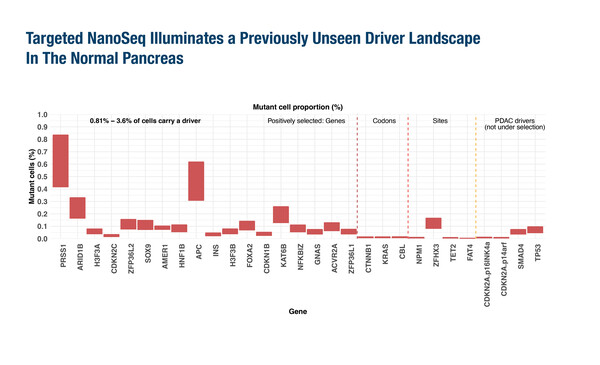Studies provide new insights into the driver landscape of these gastrointestinal tumours and show improved prediction of patient-specific outcomes.
Data presented at the ESMO Congress 2024 (Barcelona, 13–17 September) highlighted the driver potency diversity across healthy and cancerous pancreatic tissue, increasing the current knowledge on pancreatic tumour evolution for personalising treatments.
An ex vivo study demonstrated the difference in driver profiles in healthy pancreatic tissue compared with samples from patients with PDAC, with healthy tissue having a much lower mutation burden (Abstract 1O). The researchers analysed 181 pancreatic samples from 118 healthy donors alongside 62 biopsies from 4 patients with PDAC utilising a variety of techniques including laser capture microdissection, whole exome sequencing, and NanoSeq to characterise the somatic mutations. Targeted NanoSeq illuminated the driver landscape in the normal pancreas with 0.81–3.6% of cells found to carry a driver, with genes under positive selection including APC and PRSS1. In contrast, in treatment-naïve donors with PDAC, 45–64% of cells carried a driver, with KRAS and TP53 under positive selection. Incidental pre-malignant lesions were identified in 16 biopsies from 9 donors, with 33–67% of cells carrying KRAS under positive selection.
“Recent studies screening the mutational landscape of healthy tissues highlight that while driver mutations are necessary for malignant transformation, they are not generally sufficient on their own, suggesting that other environmental factors contribute to their selection and transformation (Ann Oncol. 2022;33:1239–1249; Genome Med. 2019;11:35),” says Dr Francisco Martínez-Jiménez from Vall d'Hebron Barcelona Hospital Campus, Barcelona, Spain and the Hartwig Medical Foundation, Amsterdam, Netherlands, commenting on the latest research in driver mutations. “In the presented study, remarkably KRAS and TP53, the two most frequent driver mutations in PDAC, were generally confined to pre-malignant and malignant lesions. In contrast, normal ducts showed signals of positive selection for other genes affecting essential pathways for malignant transformation. This suggests that KRAS and TP53 may have unique transformative potential, while other positively selected genes in the healthy pancreas may lack the potency to induce pancreatic carcinoma.”
Results were also presented from a study demonstrating that integration of molecular and clinical variables into functional screens conducted on patient-derived organoids (PDO) improved their predictive capabilities – including in patients with pancreatic cancer (Abstract 10P). The study collected 155 demographically and clinically relevant PDOs from 70 patients with pancreatic cancer and 85 patients with colorectal cancer. Once the PDO line was established, each was challenged with the agents the patient received in the clinic. A prospective patient response predictive model was developed that combined biochemical endpoint assay results and multimodal analysis. For the patients with complete clinical outcomes, the PDOs were able to predict overall response and progression-free survival. Moreover, including clinical and molecular variables, such as the number of prior lines of treatment and the disease type to conduct multivariate predictions, the accuracy of the survival outcome improved. Controlling for the clinical and molecular variables included in the model strengthened the predictive value of the PDO functional assay results (hazard ratio 4.36; p=0.0027; 95% confidence interval 1.66–11.41), highlighting the potential role for this type of patient-specific assay in delivering precision oncology.
Regarding the outcome of these studies, Martínez-Jiménez concludes: “Overall, these studies highlight the diversity in driver potency and that beyond driver mutations, other factors – clinical and molecular – contribute to tumour evolution and development, and ultimately to the prognosis of pancreatic cancer.”
Programme details
Nicola PA, et al. The somatic mutation landscape of the normal and malignant pancreas. ESMO Congress 2024, Abstract 1O
Proffered Paper Session 1 – Basic science & Translational research, 14.09.2024, h. 14:45 – 16:15, Salamanca Auditorium – Hall 5
Gryspeert A-R, et al. Multivariate analysis of functional organoid assays predicts patient responses in the clinic for colorectal and pancreatic cancer. ESMO Congress 2024, Abstract 10P
Poster Display – Basic science, 15.09.2024, h. 12:00 – 13:00, Hall 6







